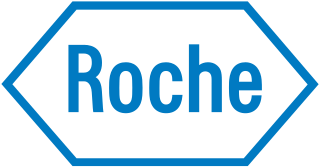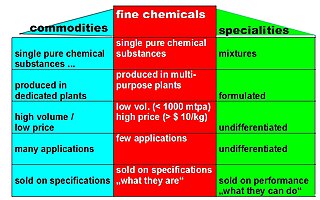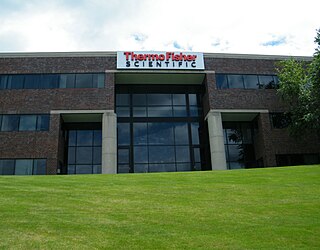
Polymerase chain reaction (PCR) is a method widely used to rapidly make millions to billions of copies of a specific DNA sample, allowing scientists to take a very small sample of DNA and amplify it to a large enough amount to study in detail. PCR was invented in 1983 by the American biochemist Kary Mullis at Cetus Corporation. It is fundamental to many of the procedures used in genetic testing and research, including analysis of ancient samples of DNA and identification of infectious agents. Using PCR, copies of very small amounts of DNA sequences are exponentially amplified in a series of cycles of temperature changes. PCR is now a common and often indispensable technique used in medical laboratory research for a broad variety of applications including biomedical research and criminal forensics.
In genetics and biochemistry, sequencing means to determine the primary structure of an unbranched biopolymer. Sequencing results in a symbolic linear depiction known as a sequence which succinctly summarizes much of the atomic-level structure of the sequenced molecule.

A DNA sequencer is a scientific instrument used to automate the DNA sequencing process. Given a sample of DNA, a DNA sequencer is used to determine the order of the four bases: G (guanine), C (cytosine), A (adenine) and T (thymine). This is then reported as a text string, called a read. Some DNA sequencers can be also considered optical instruments as they analyze light signals originating from fluorochromes attached to nucleotides.

F. Hoffmann-La Roche AG, commonly known as Roche, is a Swiss multinational healthcare company that operates worldwide under two divisions: Pharmaceuticals and Diagnostics. Its holding company, Roche Holding AG, has bearer shares listed on the SIX Swiss Exchange. The company headquarters are located in Basel. Roche is the largest pharmaceutical company in the world, and the leading provider of cancer treatments globally.
Invitrogen is one of several brands under the Thermo Fisher Scientific corporation. The product line includes various subbrands of biotechnology products, such as machines and consumables for polymerase chain reaction, reverse transcription, cloning, culturing, stem cell production, cell therapy, regenerative medicine, immunotherapy, transfection, DNA/RNA purification, diagnostic tests, antibodies, and immunoassays.

Promega Corporation is a Madison, Wisconsin-based manufacturer of enzymes and other products for biotechnology and molecular biology with a portfolio covering the fields of genomics, protein analysis and expression, cellular analysis, drug discovery and genetic identity.

Roche Diagnostics is a diagnostic division of the Swiss pharmaceutical corporation Hoffmann-La Roche which manufactures diagnostic equipment and reagents for research and medical diagnostic applications.
MilliporeSigma is an American chemical, life science and biotechnology company, before 2014 known as Sigma-Aldrich, owned by Merck KGaA.

Fine chemicals are complex, single, pure chemical substances, produced in limited quantities in multipurpose plants by multistep batch chemical or biotechnological processes. They are described by exacting specifications, used for further processing within the chemical industry and sold for more than $10/kg. The class of fine chemicals is subdivided either on the basis of the added value, or the type of business transaction, namely standard or exclusive products.
454 Life Sciences was a biotechnology company based in Branford, Connecticut that specialized in high-throughput DNA sequencing. It was acquired by Roche in 2007 and shut down by Roche in 2013 when its technology became noncompetitive, although production continued until mid-2016.
Illumina, Inc. is an American company. Incorporated on April 1, 1998, Illumina develops, manufactures, and markets integrated systems for the analysis of genetic variation and biological function. The company provides a line of products and services that serves the sequencing, genotyping and gene expression, and proteomics markets. Its headquarters are located in San Diego, California.

New England Biolabs (NEB) produces and supplies recombinant and native enzyme reagents for the life science research, as well as providing solutions supporting genome editing, synthetic biology and next-generation sequencing. NEB also provides free access to research tools such as REBASE, InBASE, and Polbase.

Thermo Fisher Scientific is an American provisioner of scientific instrumentation, reagents and consumables, and software and services to healthcare, life science, and other laboratories in academia, government, and industry. Based in Waltham, Massachusetts, Thermo Fisher was created in 2006 by the merger of Thermo Electron and Fisher Scientific, to form a company with US$ 9 billion in combined revenues.
Fermentas was a biotechnology company specializing in the discovery and production of molecular biology products for life science research and diagnostics. Since 2010, Fermentas has been part of Thermo Fisher Scientific.

A medical laboratory or clinical laboratory is a laboratory where tests are carried out on clinical specimens to obtain information about the health of a patient to aid in diagnosis, treatment, and prevention of disease. Clinical Medical laboratories are an example of applied science, as opposed to research laboratories that focus on basic science, such as found in some academic institutions.
Applied Biosystems is one of the various brands under the Life Technologies brand of Thermo Fisher Scientific corporation. The brand is focused on integrated systems for genetic analysis, which include computerized machines and the consumables used within them.
Analytik Jena AG, based in Jena, is a provider of analytical, bioanalytical and optical systems for industrial and scientific applications. Analytik Jena was founded in 1990 as a sales and service company for analytical technology. The company has been listed on the Frankfurt Stock Exchange from July 3, 2000 until March 27, 2015. Analytik Jena and its subsidiaries employ about 1,000 people in more than 90 countries. The international Group earns two-thirds of sales abroad and maintains business relationships in more than 120 countries around the globe.

Pacific Biosciences of California, Inc. is an American biotechnology company founded in 2004 that develops and manufactures systems for gene sequencing and some novel real time biological observation. PacBio describes its platform as single-molecule real-time sequencing (SMRT), based on the properties of zero-mode waveguides.
Biomatrica is a United States-based biotechnology company, and subsidiary of Exact Sciences Corporation, that develops chemicals for ambient temperature preservation of biological materials for the purpose of expanding the availability and accuracy of medical diagnostics and research. Specifically, the company focuses on improving the stability of biological materials, such as DNA, RNA, proteins, cells from patient samples used in research, and diagnostic testing reagents. Company scientists have developed alternatives to existing preservation technologies, such as cold storage and lyophilization (freeze-drying), to prevent degradation of perishable biological materials. Biomatrica's technologies are used in applications such as pre-analytic sample collection, diagnostic assays, biobanking, forensics, and basic research.








